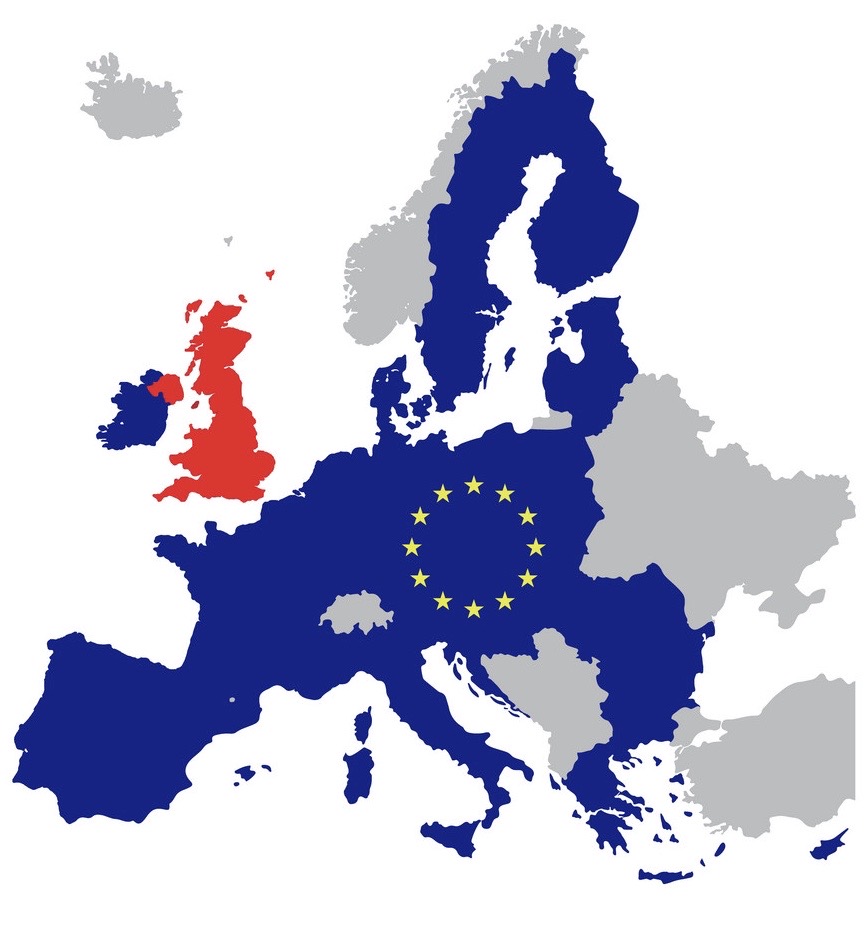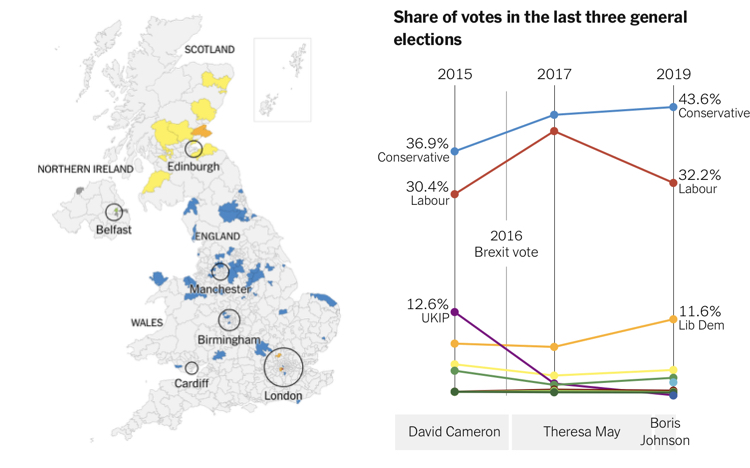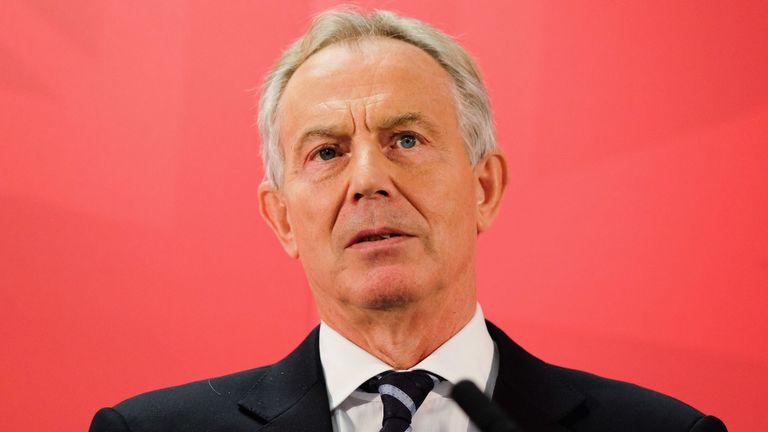A Major Shift in British Politics
Prime Minister (PM) Boris Johnson’s landslide win represents a major shift in British politics that has taken place over the past five years. Since the 2015 election and the 2016 Brexit vote, British voters have turned their political parties on their heads. Working class voters have moved rightward in a move resembling America’s recent political shift. The Labour Party assisted in this shift by making no solid stand on Brexit and by charting a course to the far left. Nothing less than a political revolution has been effected by British voters, ousting an entrenched establishment in favor of Brexit and reform. For a basic overview of the election results see the recent Political Vanguard article The Brexit Landslide.
Underestimating Brexit
The British political establishment seems to have underestimated the desire of British voters to have the ultimate say over the policies that will impact their lives. The European Union was originally intended as a trade zone, the idea being to set customs regulations and basic economic laws and policies at the supranational level, such that all the member states could enjoy relatively free trade and free movement within. Sadly, the EU has long failed to live up to these goals. The EU has written tens of thousands of pages of regulations on everything from cabbage farming to fishing practices. It has seen both the naissance and bloating of a massive Eurocracy that is wholly unaccountable to the peoples of the member states. It has become a vehicle for the implementation of socialist environmental policies and a litany of leftwing policies long on the wish list, but unpopular to implement at the national level. Far from a mechanism for the promotion of trade and prosperity, the EU has become a means of forcing unpopular policies on Europe undemocratically.
It should not come as a surprise that having buried the economies of Europe beneath a mound of red tape, European economies are slowing. The Euro as a currency is facing a deflationary spiral. Europe is slowly descending into a recession. British voters do not want to sink with the EU. If European leaders cannot reform the EU to make it more palatable to the voters of its many members states, then the whole organization may come crashing down. There is significant concern that the EU itself will not survive Brexit. Many eastern European member countries, for example, have been complaining for some time at how they wish to pursue free market policies but are hampered by the EU. Members like France and Germany are afraid of having to compete with these economies. As a result, the EU has become an institution that mostly serves the interests of French and German economies at the expense of other members; it has become a Franco-Prussian Empire.

It is no surprise, then, that voters are increasingly unhappy with the EU throughout its member states. The fiercely independent United Kingdom, which has never truly been part of the continent, is just the first nation to express this displeasure so openly. Several Eurosceptic parties have arisen around the EU and they regularly win seats in the new European parliament. In the UK in particular the desire for voters, especially working class voters, to assert control over national policy making has manifested itself in a massive turnover in political leadership. In 2015 the Tories won a majority of seats in the House of Commons with a mandate to pursue austerity (a balanced budget). Then-Prime Minister David Cameron seemed to be riding high. The establishment right seemed to be on top of its game. A 2016 referendum on EU membership seemed a sound way to end all the jawing of the Eurosceptics. If a majority endorsed remaining in the European Union, the matter would be settled once and for all time. When the results returned nearly 52% for the Leave campaign, to depart the EU, the establishment was at a loss to respond. Having lost the referendum, David Cameron, the once unstoppable leader of the British right, stepped down.
Theresa May followed him as PM and tried to find some half-measure betwixt leaving the EU while remaining within most of its structures. This approach failed miserably on several occasions. In 2017, Theresa May led her party to early elections that saw the Labour Party make gains and brought the Tories just beneath an outright majority. It was clear that voters were still unhappy with her approach. By 2019 it was obvious that her leadership had failed. Boris Johnson, the longtime Eurosceptic who supported the Leave campaign in 2016, ascended to the leadership and became Prime Minister. Johnson set to work immediately to press forward with Brexit. His efforts were stifled by the House of Commons when the majority refused to back a quick or “hard” Brexit. Several Members of Parliament (MPs) even left the Conservative Party over his policy. Johnson tried the not unprecedented, but rare, step of asking the Queen to prorogue Parliament (send the Houses into recess), in order to aid the PM. The EU extended its deadline, and Johnson renegotiated the agreement with the EU to leave. Given the results of the recent election it would seem the PM’s policy was right. The Prime Minister can now press forward with the deal he has with the European Union and enter into the subsequent trade talks.
Voters have effected a complete political revolution in the UK in just these short years. The parties have been turned inside out and upside down. Prime Minister Johnson ran in the most recent election on a platform of quick Brexit, government reform, and slightly increased spending. These are hardly the typical core issues of the political right in the UK, which, similar to that of the United States, generally supports reduced government and less spending. It seems that certainty on the Brexit question was the voter’s most important goal. British markets rose sharply on the news of Johnson’s landslide victory. Now he will finish Brexit and open negotiations with the European Union and the United States aimed at new trade deals. In the United States, at least, President Donald Trump seems optimistic that a trade deal can be reached quickly to mutual benefit.

The Labour Implosion
Labour could not find a stance on Brexit. Fearing that support for Brexit would alienate Remain voters and that opposition to Brexit would alienate Leave voters, Labour tried to straddle the issue. Their position involved asking for a delay of the Brexit deadline from the EU, so the UK could hold another referendum on whether to remain in the EU. Voters could see through this weak excuse for a stance on Brexit, and Labour suffered terribly at the polls—its worst defeat since 1935.
While Labour certainly lost ground in regions that voted in favor of Brexit, Labour lost seats and votes everywhere. What was behind Labour’s total defeat? Labour Party Leader Jeremy Corbyn chose to set out a hard left and highly socialist agenda for the election. Promising free everything for everyone and a hike in the minimum wage, a sure way to increase unemployment while raising the cost of living, Corbyn’s Labour hoped their extreme left agenda would garner them votes. Instead, they went down to an incredible defeat. The Labour leader’s own personality and views played significantly into this equation. Long a fan of Soviet style communism and an outspoken leftist, Corbyn is the Labour MP you would most expect to pitch an extreme left agenda. He could not credibly put forth a sensible, centrist platform as this would seem all the more disingenuous.
Jeremy Corbyn’s antisemitism also drove public disapproval of the British left. Corbyn has long taken a hardline anti-Israel stance, offered public support for terrorist groups like Hamas, and supported the BDS movement. The pro-Israel Conservatives leapt at the opportunity to contrast Corbyn’s bigotry with their pro-Jewish positions. Labour never truly answered the antisemitism issue and honestly could not hope to so long as Corbyn was their Leader. Over the past few years, several Labour MPs have abandoned the party over Corbyn’s antisemitism. On this issue, Corbyn could not stop the bleeding.
Following his incredible failure in leadership, Corbyn did announce that he would be stepping down in the future but has yet to set a precise date. In comments made since the election, Corbyn claimed his platform had “won the argument” and “changed the debate” in British politics. He blamed the defeat on media criticism and Johnson’s simplified message of “get Brexit done.” Many have been quick to point out that Labour cannot have won any argument or changed any debate if it went down to an epic defeat. In a recent speech to a Labour Party gathering, former Labour Prime Minister Tony Blair (1997-2007) said Labour faced an “existential crisis.” Mr. Blair is the only living Labour Party leader who has led the party to victory in national elections in 1997, 2001, and 2005. He did this by tacking to the centre and proving that Labour could offer a prosperous economy; very much the opposite of Jeremy Corbyn.

The Labour Party has arranged to hold a leadership contest which it hopes to conclude in three months time. Local elections take place in just five months and many Labour MPs are very reluctant about the possibility of Corbyn leading them into those polls. While some Labour MPs have been reticent to express their opinion on Corbyn, a powerful figure in Labour, a few have spoken up by calling for Corbyn’s immediate departure from the leadership post. Many in Labour are looking to disavow Corbyn and find a new message. If Britain is to have a competitive democratic system, Labour will need to get back on its feet, reconnect with voters, and listen to their needs. It will take some time for them to rebuild. It may very well be the 2030s before Labour poses a serious threat to the Tory majority.
The Socialist Left in Decline
This is not a phenomenon limited in scope to the United Kingdom. In the French elections of 2017 voters rejected the traditional right and left parties in favor of President Emanuel Macron’s En Marche Party. The former left party, the Socialiste Party has vanished from politics. In Germany, the SPD, long Germany’s socialist left party, has been devastated by serving repeatedly in coalitions with Chancellor Angela Merkel’s centre-right CDU, and a new leftist party has formed, Die Linke (the left). This fractured left is busy with in-fighting and has yet to present a serious threat to the sitting government. The left has crumbled in Australia and New Zealand. In Canada Justin Trudeau narrowly won reelection this year, amid scandal and frequent embarrassment. His stale Liberal Party majority is not long for government. At the next election the Conservatives can be expected to resume national leadership. In the United States the defeat of the Democrat Presidential candidate Hillary Clinton in 2016 has destroyed that party. Unable to find an answer to Donald Trump’s popular presidency, they have resorted to using the impeachment process, an awkward piece of constitutional machinery that cannot possibly lead to the President’s removal from office. In their turn toward unpopular socialist policies, it seems the American left is likewise on course for devastating results in next year’s election.
Throughout the Western World, the traditional socialist and left parties are crumbling as voters seek out alternatives to their tired big government approach. Working class voters are hardly rightwing in their sentiments, but they are growing impatient of a political elite eager to condescend to them and unwilling to answer popular demands. Meanwhile, the right in many countries is adjusting its approach to accommodate these disgruntled voters, and with positive results.
Implications for America
Although separated politically for nearly two and a half centuries, the Untied States and Britain share similar cultures and tend to observe similar trends. Rock-and-roll became popular in the US and then took off in the UK leading to the rise of the Beatles, who went on to become a sensation in the US, for instance. This is but one of many examples of the cultural exchange between the two peoples in the last century. Should the American left be taking notice of the results in the UK? Should they be considerate of their own conduct? Should they show themselves more eager to address the problems facing ordinary Americans today, rather than merely “resisting” a President whom they dislike? Might their candidates tack in a very different direction when it comes to leftist policies? If the Democrats do not ask these questions and arrive at different answers then they have of late, they may very well go on to share the fate of Jeremy Corbyn’s Labour Party.







